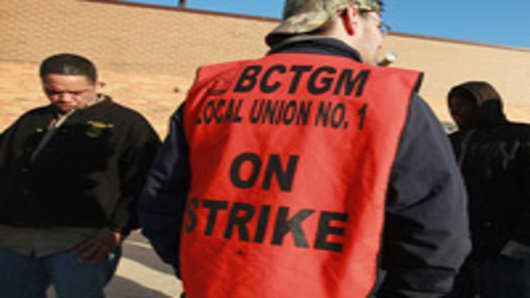"We've done everything within our power to sit down and talk with corporate executives of Walmart," said Harris. "We tried to talk to our managers and address these issues as far as treatment of associates who choose to speak out and they seem like they just don't want to listen to us and address these issues."
It was in September of this year that workers' union at Hostess Brands—now bankrupt and manage by a private equity firm, Ripplewood Holdings, and two hedge funds—rejected the company's' latest offer, which included cuts to wages and benefits. After a bankruptcy judge imposed the contract anyway, union members responded by walking out.
Striking Hostess workers admitted that the walkout could push the company into liquidation—and the loss of some 18,500 jobs. But an employee who walked out at a Hostess plant in Seattle, Washington told reporters last week that "we know we will probably lose our jobs, but if we accept these concessions, standards for bakers and other workers will keep going down. We are taking it on the chin for workers all over."
That kind of unity is creating a new wave of worker activity, said Jim Matthews.
"If workers feel they have the same contract as others in their industry, they may feel like there's less of a race to the bottom," said Matthews who said he usually deals on the management side of labor issues. "And workers are saying to companies, 'why do we have to take cuts when other parts of your business, like suppliers are not. Why is it on our backs?'"
What's also fueling a modern day worker effort are modern day tools, said Dave Kurtz.
"Employees are getting their message out through Facebook, Twitter and other social media sites in a way that's obviously different than in the past," Kurtz said. "They can immediately reach out to each other, organize and even solicit donations that way. It's a quick way to get the message not only locally but across the country."
Worker activism—large and small—continues.
Some 44 steelworkers in Niles, Ohio are still off the job after walking out from the Phillips Manufacturing Plant in September. Workers at the Detroit Waste Water Treatment Plant walked off the job on Sunday, Sept. 30, and remain on the picket line.
Bus drivers Beloit, Wis., say they are ready to strike unless First Student Inc., the private company with a contract with the Beloit School District, meets their demands for a wage increase.
But Kurtz and other analysts say this new found labor movement has to be careful about going too far—and doing more harm than good.
"Some companies need to make cuts to say alive. Firms don't always have a choice about how to run themselves and closings and concessions are part of business," said Kurtz. ""You can't just have a visceral reaction. Both sides need to be involved in a thoughtful process."



